Urethane: Legendary Skateboarder Steve Caballero is Back with the Raddest New Punk Band We’ve Heard in Years
I can remember a time when my skateboard was covered from nose to tail with stickers. Most of them were freebies from the local skate shop, or they came included with a new set of trucks or wheels. There was one, though, that stood out. It was a sticker for The Faction, a band that I wouldn’t actually hear until someone passed me a homemade tape years later, but one that I knew I’d love because I loved their founder with all my heart, Bones Brigade member Steve Caballero.
Back then, the Bones guys were kings in our world. We wanted to be them, we wanted to skate like them, we wanted…well, we wanted to find Animal Chin, I suppose. The main problem with that dream was that we all kinda sucked. And it was hard to keep a vert ramp going when it snowed six months out of the year. But that didn’t stop us from trying, and loving skateboarding with every fiber of our being.
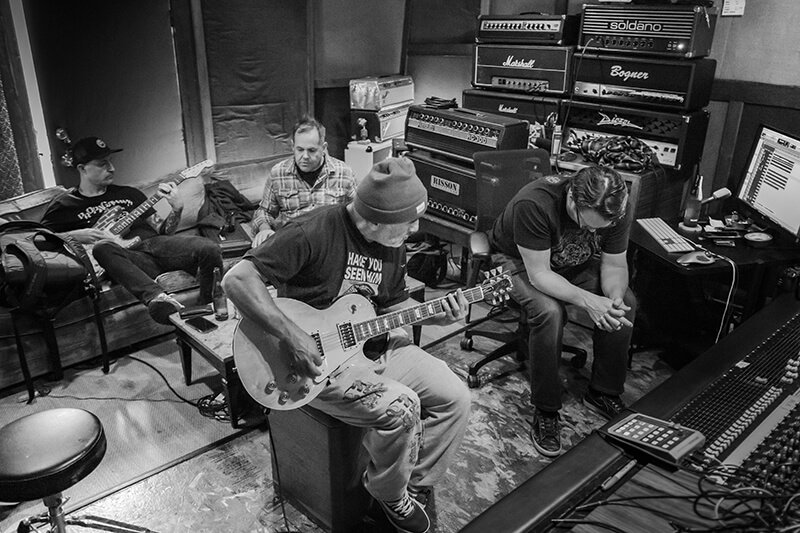
Cut to the day when I did actually hear the Faction, and underground punk in general, for the first time. I was hooked from the first power chord – it was like the energy of skateboarding captured in musical form. And here we are, all these years later, celebrating the next chapter in Caballero’s continued journey to become the gnarliest dude who ever lived. Back with a brand-new band, aptly called Urethane (if you know, you know) featuring Cab himself on guitar, Tim Fennelly, bassist Chad Ruiz, and drummer Dylan Wade plus some very special guests on their debut LP, Chasing Horizons.
We recently caught up with Steve at his home in California as he was recovering from a recent band rehearsal, to chat about his punk beginnings, the new band and his approach to making music.
Hey Steve, thanks for talking with us. Can you give our readers a sense of how music entered your life originally? And which came first, the music or the skating?
As far as being in bands, skating definitely came first. It actually introduced me to rock and roll. I lived on the east side of San Jose, so I was primarily listening to R&B music, soul and even disco back then. When I ventured over to the other side of town where the skateparks were being built, this was maybe ’77 or ’78, [the kids there] were all listing to rock and roll. And that’s when I got introduced to bands like AC/DC, Cheap Trick, and Aerosmith. And after that, things evolved into more new wave-type music, like the B-52s, Gary Numan, the Cars, Missing Persons…that kind of stuff.
When the ’80s came in, it went right to punk rock [laughs]. It hit skateboarding full blast.
What do you think it was that linked skating and punk so closely, was it just the pure energy of it all?
The movement of punk rock meshed well with the movement of skateboarding because it was kind of looked at the same way. Rebellious, rough around the edges, not mainstream. Raw, you know? There wasn’t a lot of money to be made in it, and it was very DIY.
So, you shared a lot of the same ethics as the punk bands of the time, then.
Pretty much. And just the raw energy of skateboarding went really well with punk rock music. And that was the choice of music that I became more and more attracted to – I was listening to a lot of bands like Minor Threat, Bad Brains, then English bands like Exploited…Chaos UK.
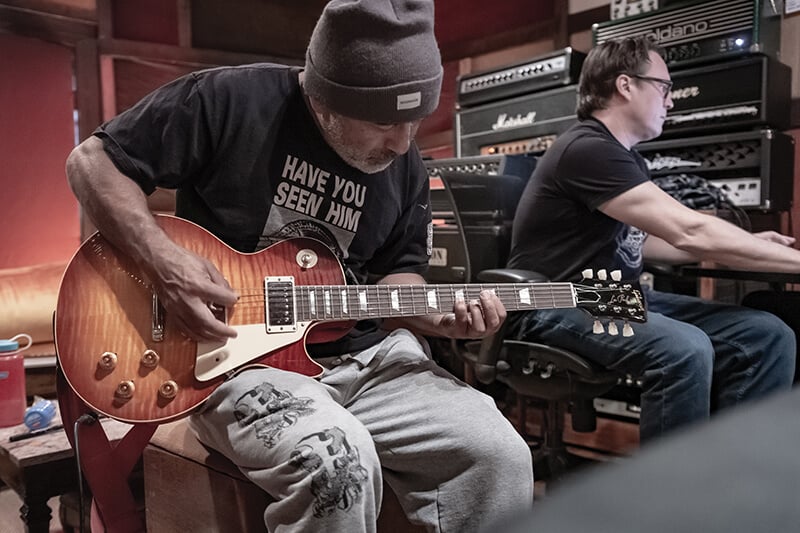
All the skate parks started closing in 1980 and 1981 so we started going the backyard route, I built a ramp in my backyard and we’d go looking for pools…just a lot of skating in the streets. But a lot of the guys I met at the skatepark were hanging out at my house, and we started going to a lot of local punk shows. We’d go see bigger acts…Fear was big at the time, Social Distortion, a lot of punk bands were touring [there] so in 1982 I picked up a bass and decided I wanted to start my own band.
And that was the origin of The Faction?
Yeah, we wrote our first EP in 1982…I remember being in the studio tripping out, like ‘I’ve only been playing bass for six months and now I’m recording.’ [laughs]
Well, that’s kind of one of the great things about punk, though, isn’t it?
I was still learning how to be in a band. Our first show in ’82 we opened up for Social Distortion and we played with bands like DOA, Suicidal Tendencies, TSOL and after that we made an album, another 45 and then another album and went on a U.S. Tour in 1984 in a small van.
Our guitarist owned his own little label and put out our records and he booked this tour. I was a professional skateboarder at the time, I had turned pro back in 1980, so people knew me as a skateboarder and by 1984 we were making skateboarding videos and [skating] was getting super huge…but then I went on this tour with the band and it was basically one of my very first tours playing backyard parties, little gigs, clubs and warehouses…we made it all the way to CBGB’s. By 1985 I switched to guitar, we did another tour around the U.S. – the band pretty much lasted from 1982 to 1985 after that second tour around the country and then we broke up.
Did you ever find a period when skating was interfering with the music or music was interfering with the skating?
We would religiously skate the ramp in my backyard and then come in and practice music, go back out and skate. So, I kind of juggled it.
I remember this funny story with me skating this backyard ramp contest, wearing these bondage pants with a bomber jacket and my hair was all dyed. It was one of the very first backyard ramp contests, and I fell in the prelims, and Stacy [Peralta, team manager of the Bones Brigade and co-founder of Powell-Peralta] coming up to me an giving me a hard time, yelling at me like, ‘Don’t you even care about skateboarding anymore, or are you just so into this punk rock thing? Do you even care? I can’t believe you’re skating like this!’
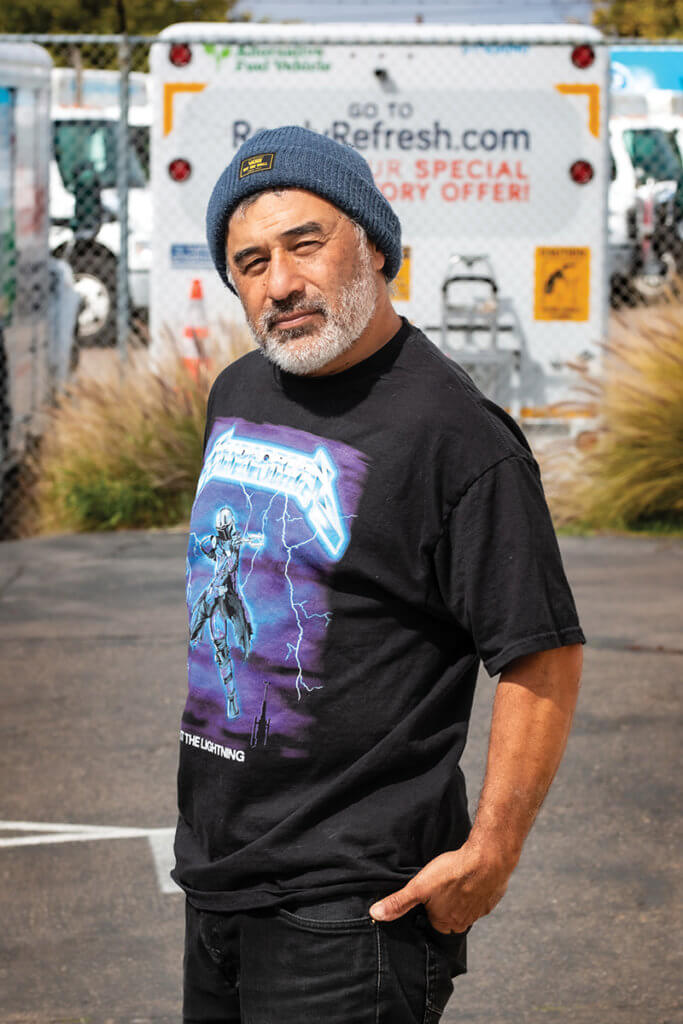
And I picked myself up, and was like, ‘I’m gonna show him!’ and I ended up winning the contest [laughs]. So, there may have been people thinking that the music was taking away from the skating, but if anything, it enhanced my personality, it enhanced my creativity…I went on two tours with the Faction before I ever toured with skateboarding.
[editor’s note – at this point in the conversation we go off course, reminiscing about fellow Bones Brigade member Tommy Guerrero and his music, which might be a story for a future issue…]
Let’s talk about the new project, Urethane.
Coming up with a band name these days is impossible [laughs]. Everything has been taken! I always had that name on the backburner, so when I started this new band, I asked my singer Tim what he thought, and he said, ‘Oh, that’s perfect!’ So, I googled the name to see if it was taken, and sure enough it wasn’t!
[ed. note — for a little history, the urethane skateboard wheel came out in 1973 and a company Cadillac Wheels introduced it to the market at large. Before then, everything was either steel, clay, plastic or rubber…skaters still use urethane wheels today along with bearings for smooth riding]
So, you got the new band going during the pandemic. How did that work for you?
I was playing in another band; I was jamming with them for about a year, and I was playing bass at the time. The guitarist was in another band I was in, Soda, from back in the day. These guys were solid musicians, we had about 8 or 9 songs, but we really needed a singer. So, I put out a little Instagram post saying we were looking for a singer, and this is where Tim, our singer in Urethane, comes along. He sent us a demo of two songs, and I really, really fell in love with it. So, I brought them to the band I was working with at the time, and they listened and were like, ‘Nah, it’s not gonna work out.’
I was like, ‘Whoa, I guess we’re not on the same page.’ I had to sleep on it, but it was a decision I had to make. I knew I had to work with Tim, I loved his songwriting, I loved his sound. So, I called the band and told them I was willing to give up a year’s worth of work to go in a new direction.
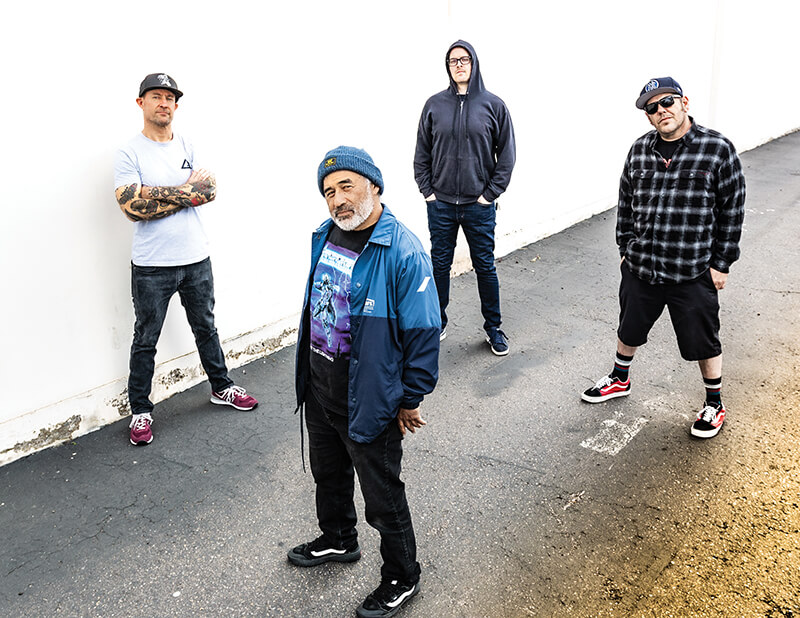
So, I met with Tim, explained to him that I was quitting the band to join up with him, and we started writing music. About four months in, I got this feeling that the band would really be better if I switched to guitar. Tim was like, ‘I can’t believe you’re telling me this. The guy I introduced you to at the last practice, Chad, really wants to be in the band and he can play bass.’
So, Chad came in, and he knew a lot of Tim’s work because they had jammed in a previous band called War Fever, which he’s still actually in. This new music Tim was doing was very surprising to Chad and even his other band…so we practiced, and it sounded insane, and a week later Chad brings us to the table and says he met with El Hefe from NOFX and he played them Tim’s demo tape and they fell in love with it, and they wanted to produce a record for us.
So that’s how everything came together for us in just four short months [laughs].
It was meant to be!
One thing just led to the other. So, we had this Zoom call with El Hefe, and he asked if we could be ready in three months to meet [producer] Cameron Webb, because they wanted him to produce our record. We worked really hard in the pandemic practicing twice a week, learning 12 songs, putting them together and rearranging them so they were good enough to go into the studio and record.
Were you guys able to record and rehearse in the same physical space during the pandemic?
It’s funny, because he was wearing a mask at every rehearsal, I didn’t actually know what Dylan’s face looked like for months! Other than that, the pandemic in turn kind of helped bring this group together and write a record. What’s odd is that we haven’t played live much…we’ve been working on that element more lately now that things are opening up, but we finished an album before we ever really played in front of an audience.
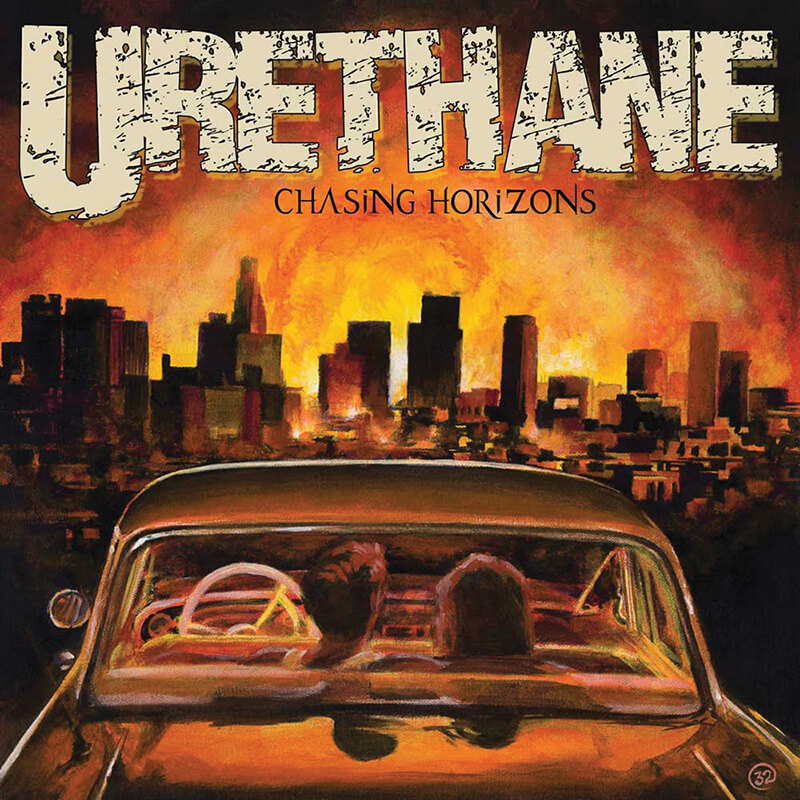
How did the recording process end up going?
When we came into the studio, we spent three weeks recording this album and went in with certain songs and came out with completely different ones. There are a lot of leads and melodies that were created in the studio. When we were recording backing tracks, I would hear these little melodies in my head, just sitting on the couch, and I had an acoustic that I was jamming along with. When it was my time [to record], I’d even scrap some of my rhythms and play those melodies [instead].
What’s funny, is that when we left the studio and went back to rehearsing, I’d go back to those rhythm tracks because I didn’t remember what I had played in the studio. [laughs]
Follow on Instagram @urethane_music and @stevecaballero
Photos by Jeremy Frasca
